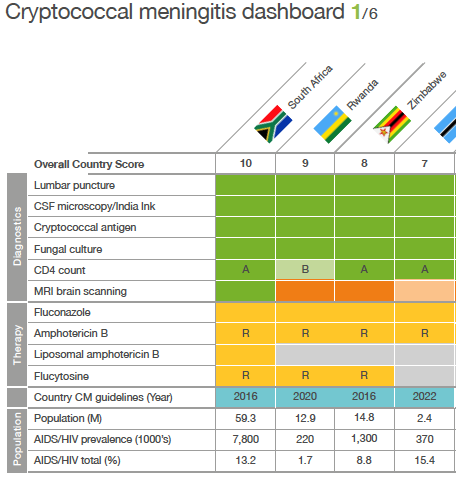Today, Global Action For Fungal Infections (GAFFI) released a visual dashboard showing the capacity for high-quality care for cryptococcal meningitis in each country in Africa.
Assembled following a continent-wide survey of diagnostic practice, the dashboard shows which countries can rapidly diagnose this life-threatening infection, and which cannot, or can do so only partially.
The dashboard is being issued 12 months after the global call to “End Cryptococcal Meningitis Deaths”. Some progress has been made in the registration of flucytosine in Malawi, South Africa, and Zimbabwe, and the publication of the largest randomized trial of this disease shows that a single high dose of liposomal amphotericin B (combined with flucytosine and fluconazole) is as good as a week’s daily course.
High country scores require cryptococcal antigen readily available, along with lumbar puncture and fungal culture, and CD4 counts. Treatment requires rapid access to amphotericin B, flucytosine, and fluconazole. Guidelines (often modeled on WHO guidelines) should identify these necessary elements for excellent care, along with general guidance on who to test and how to manage the non-meningitis disease and antiretroviral therapy.
There is much variability across Africa in the frequency and capacity to successfully treat the fungus Cryptococcus, which causes meningitis.
Professor David Denning, Chief Executive of GAFFI and of the University of Manchester said: “While there are some countries really delivering excellent care to their citizens with cryptococcal meningitis, many have an incomplete portfolio of diagnostic tests and antifungal drugs, sufficient to drive down mortality. Many advocates and agencies are willing to or are directly addressing this issue, but the lack of action in many countries is allowing too many to suffer and die.”
